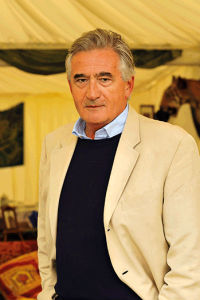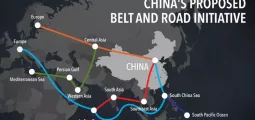Antony Beevor: History as a Collection of Telling Details
 He did it again and delivered an instant classic. After Stalingrad, Berlin, Crete, Paris, and the Ardennes, military historian and author Antony Beevor now revisits and re-examines the fighting in and around the Dutch city Arnhem in The Battle for the Bridges 1944 – a shortcut to victory masterminded by Field Marshal Bernard Montgomery and an almost successful attempt to bypass the German Siegfried Line which shielded the country’s industrial heartland.
He did it again and delivered an instant classic. After Stalingrad, Berlin, Crete, Paris, and the Ardennes, military historian and author Antony Beevor now revisits and re-examines the fighting in and around the Dutch city Arnhem in The Battle for the Bridges 1944 – a shortcut to victory masterminded by Field Marshal Bernard Montgomery and an almost successful attempt to bypass the German Siegfried Line which shielded the country’s industrial heartland.
In a field crowded with exceptionally gifted military historians, Antony Beevor stands out for bravery. Few history writers would dare to rework the entire Second World War in a single, albeit hefty, volume and draw new conclusions. In his almost universally praised The Second World War (2012), Mr Beevor includes all fronts, beginning with the Japanese invasion of Manchuria in 1931 and ending fourteen years later with Japan’s signing of the instruments of surrender aboard the USS Missouri in Tokyo Bay which signalled the end of hostilities.
Mr Beevor pulls no punches when unravelling the many myths amplified by the passage of time. He concludes that the reputations of both Bernard Montgomery and Erwin Rommel, the two opposing field marshals who met on the battlefields of North Africa, are vastly overblown. The historian points out that Rommel refused to accept responsibility for the German debacle in the desert sands whilst Montgomery proved overly cautious and as a result was unable to fully exploit his advantage.
Mr Beevor brings history alive by giving a voice to its participants. This makes for a gripping account and delivers haunting particulars not usually included such as the details provided by a Russian soldier in a letter to his mother: “One walks on corpses, sits down to rest on corpses, and eats one’s meals on corpses. For about ten kilometres, there are two corpses of Fritzes on each square metre.”
Eyewitness accounts such as this one appear throughout his books and help explain why Mr Beevor calls WW2 the greatest man-made disaster in history. As he relates the widespread cannibalism amongst starving Japanese soldiers, Mr Beevor drives home the unspeakable horror of war and shines a much-needed light on its human dimension. He does so again in his latest book about the battle for the bridges (Operation Market Garden) which, Mr Beevor writes, was doomed from the start, but still might have succeeded.
The writer approaches the epic battle as a forensic investigator, unearthing all minutiae in an attempt to describe the chaos on the ground as lived by the troops. Again, Mr Beevor assigns a significant portion of the blame for the unfortunate outcome to Field Marshal Montgomery who is depicted as an insufferable bore equipped with an inflated ego. Mr Beevor also rescues the reputation of Polish general Stanislaw Sosabowski who opposed the operation from the start and was made into the scapegoat of its failing.
Mr Beevor also disassembles the myths that accumulated thick and fast after the battle was fought and lost. He makes no attempt to embellish the defeat and turn it – in the vein of Dunkirk – into a heroic victory. Unlike Cornelis Ryan whose 1974 account of the Battle of Arnhem – A Bridge Too Far – was made into a Hollywood blockbuster, Mr Beevor dives headlong into to gory details of a ill-conceived operation that cost more than 3,300 lives on both sides in addition the countless civilian casualties. The German retribution that followed – a blockade of the northern half of The Netherlands – which plunged to non-liberated part of the country into its “Hunger Winter”, the famine of 1944-1945 that killed an estimated 22,000 people.
In his signatory style, Antony Beevor lets the survivors tell their tale, thus highlighting the plight of Dutch civilians caught in the crossfire – an aspect often overlooked or treated as a mere footnote to the grand military procedures unfolding in the Arnhem marshes.
Antony Beevor is a prolific researcher and writer. He has also published major works about the Spanish Civil War and the Soviet Union. Early on in his career, Mr Beevor also wrote two novels, a genre he – perhaps thankfully – never revisited.
You may have an interest in also reading…
King Abdullah II: An Insistent Appeal to Moderation and Reason
As Jordanians look back on twenty years of peace with Israel, they find little reason to celebrate the anniversary of
Paul Krugman: The Last of the Keynesians
He doesn’t hold out high hopes for the Trump presidency: in fact, calamity is on the horizon. Barely a month
Thomas Kaplan: Building Bridges with Art
He has more Rembrandts – eleven paintings and two drawings – than any other private art collector. Billionaire investor, philanthropist,




























































































